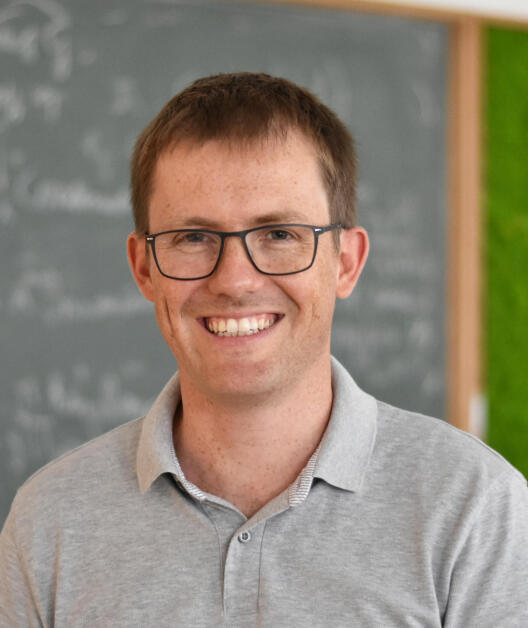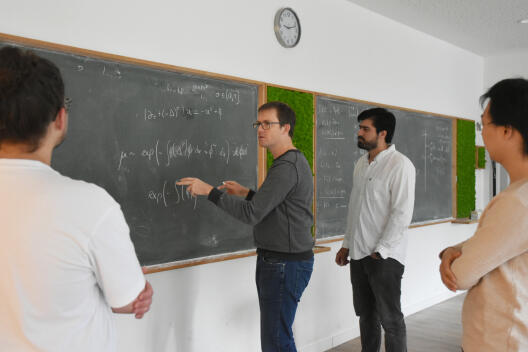Bridging the gaps for Mathematics Münster

Networking between various field of mathematics enables new perspectives to be seen and promising research methods to be shared. With the aim of strengthening this approach, the Cluster of Excellence Mathematics Münster has established special "Bridging the Gaps" professorships for mathematicians who bring together a variety of fields in their research – such as Prof. Hendrik Weber. In September 2022, Weber, an expert on stochastic analysis, moved from the University of Bath to the Institute for Analysis and Numerics in Münster. He brought with him a recently approved ERC Consolidator Grant.
Hendrik Weber (41) is working on high-dimensional systems with random influences – so-called stochastic partial differential equations (SPDEs). "Such equations are important in many fields of application," says Weber, "for instance, in modelling the evolution of species, in fluid mechanics, or in the analysis of statistical methods." He is working primarily on equations from mathematical physics. He and his group investigate basic properties of these equations such as their solvability or the regularity of solutions.
In his schooldays Hendrik Weber, who grew up in Leverkusen, was already fascinated by the mathematics behind natural sciences such as chemistry and physics. He embarked on his studies in mathematics at the University of Heidelberg, took part in a study programme at the Ecole normale supérieure de Paris (ENS) for a year, and then took his degree at the University of Bonn. He stayed in Bonn to write his doctoral thesis, with Karl-Theodor Sturm as his supervisor, which he completed in 2010.

Inspirational time as a postdoc with a Fields Medallist in England
During a stay in the US, he met the later recipient of the Fields Medal, Martin Hairer, who was doing research into SPDEs with applications in the field of statistical mechanics. "I was immediately impressed by his clarity," Weber remembers – which is why he didn’t hesitate for very long when Hairer offered him a postdoc position, even though it meant moving to the University of Warwick in its more rural setting and not, as he had hoped, to the hustle and bustle of New York. "The time at Warwick was very inspirational, and there were lots of great people in the working group," Weber recounts. "Martin found a great deal of time to sit and discuss with us in the Common Room. And it was a highlight, of course, to be there when he was awarded the Fields Medal in 2014."
Weber stayed at Warwick for a total of eight years and made a career in the British academic system: from postdoc to lecturer, then to associate professor and finally reader. His research successes were rewarded with the Rollo Davidson Prize in 2016 and the Philip Leverhulme Prize in 2017. In 2016 he was awarded a research scholarship for junior researchers by the Royal Society. In 2018 he was appointed to the Chair of Probability at the University of Bath.
Why the move to Mathematics Münster? What impressed me here were the dynamics and the positive atmosphere.
Early last year, he received the happy news that the European Research Council had approved an ERC Consolidator Grant for him – amounting to around two million euros – for his project entitled "Global estimates for non-linear stochastic PDEs". The grant took effect in October – and now he is using it in Münster, since taking up his professorship at the Faculty of Mathematics and Computer Science at the University in September 2022.
Why the move to Mathematics Münster? "What impressed me here were the dynamics and the positive atmosphere," says Weber. He is looking forward to expanding his working group – two doctoral students joined him in moving from Bath to Münster – as well as to continuing work on his current projects and developing new research topics, also in collaboration with other members of the Cluster of Excellence. "Fundamental mathematical questions certainly interest me," he says, "but I also find applications fascinating – for example, in the direction of data science." On a private level, too, he and his family have settled down well in Münster. "We even found places for our children in a bilingual day-care facility," he says.
"Collaboration is possible across all borders"
During his career, Hendrik Weber has repeatedly met scientists who have influenced and supported him – for example, Tadahisa Funaki during his time as a doctoral student, Felix Otto after completing his PhD, and Andrew Stuart at the University of Warwick. He hopes that he can make his contribution to Mathematics Münster being an inspirational place for all researchers, irrespective of background and career stage.
One of the best features of his job, says Weber, is that the mathematics community is so open and international. "You can go and stand at a blackboard and discuss with mathematicians anywhere in the world," he says. “Collaboration is possible across all borders."
It’s always a special moment for him when, after much rumination, he has a coherent solution before him. "Suddenly, everything is simple then," he says. "This eureka moment can come quite suddenly. For example, I worked with Jean-Christophe Mourrat intensively for a lengthy period of time. We once had an intensive work meeting in Lausanne, lasting several days – and on the way back I suddenly had the idea for one of the parts of the jigsaw that had been missing for the solution to our problem. I was just eating a pizza at Geneva airport!"
Links:
Prof. Hendrik Weber: University website and contact details
Institute for Analysis and Numerics
Press release from European Research Council (ERC) on Consolidator Grants 2022 (Jan. 2023)

